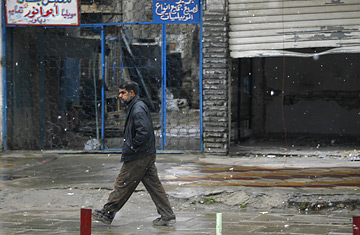
A resident walks along a street during snowfall in Baghdad, Iraq, January 11, 2008.
The smell in the air early Friday morning in Baghdad was unmistakable. A wispy, metallic scent hung everywhere in the gray dawn breaking over the city. And anyone who's seen fall turn to winter north of the Mason-Dixon Line could have told you what it meant: snow. By 8 a.m. Friday local time a thin rain falling on Baghdad was turning ashy as snowflakes seemed to materialize somewhere in the middle distance and drift sideways through the city. The morning call to prayer rising up from mosques seemed slightly muffled in the hush that came as puddles stopped snapping with drops. Residents on the streets peered upward in wonder while huddling in heavy coats.
No one could remember the last time they saw snow fall in Baghdad. Some Iraqis said such a thing had never happened. Others claimed snow came to Baghdad more then 40 years ago, when the city had far more green areas instead of one big Green Zone. Everyone seemed astonished as the snowfall continued through much of the morning while Baghdad came sluggishly to life as it does each Friday, the start of the weekend here.
The capital has been especially cold this winter, with low temperatures at night hovering just above freezing for days at a time. Longtime residents say it's been 10 years or more since such frigid weather gripped the city, where many struggle to warm their homes amid persistent electricity outages. But on Thursday night, as the temperature dropped in the darkness, something more familiar was in the air over Baghdad: the echo of American bombs.
U.S. military officials said Friday that warplanes hammered extremist strongholds south of Baghdad with one of the heaviest airstrikes Iraq has seen since the U.S. invasion in 2003. A pair of B1-B bombers and a quartet F-16s unleashed 48 bombs in an area south of Baghdad called Arab Jabour, where insurgents were thought to be stashing weapons and explosives. U.S. and Iraqi ground forces swept into the area following the air attack, U.S. officials said.
The assault was part of a nationwide military offensive against remaining guerrilla strongholds of al-Qaeda in Iraq, a Sunni insurgent group whose ties to Osama bin Laden remain disputed. U.S. officials say the offensive will continue but refuse to reveal how long it will go.
Military jets could be heard over Baghdad late Friday, as the sun broke through the clouds. Forecasts say the weather in Baghdad is supposed get warmer in the week ahead, with several clear days seeing springtime temperatures.
